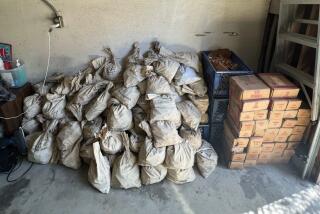Cash stash enriches no one
- Share via
CLEVELAND — A contractor who found $182,000 in Depression-era currency hidden in a bathroom wall has ended up with only a few thousand dollars, but he feels some vindication.
The windfall discovery amounted to little more than grief for contractor Bob Kitts, who couldn’t agree on how to split the money with homeowner Amanda Reece.
It didn’t help Reece much, either. She testified in a deposition that she was considering bankruptcy and that a bank has foreclosed on one of her properties.
And 21 descendants of Patrick Dunne, the wealthy businessman who stashed the money that was minted in a time of bank collapses and high joblessness, will each get a mere fraction of the find.
“If these two individuals had sat down and resolved their disputes and divided the money, the heirs would have had no knowledge of it,” said attorney Gid Marcinkevicius, who represents the Dunne estate. “Because they were not able to sit down and divide it in a rational way, they both lost.”
Kitts was tearing the bathroom walls out of an 83-year-old home near Lake Erie in 2006 when he discovered two green metal lockboxes suspended inside a wall below the medicine chest, hanging from a wire. Inside were white envelopes with the return address for “P. Dunne News Agency.”
“I ripped the corner off of one,” Kitts said during a deposition in a lawsuit filed by Dunne’s estate. “I saw a 50 and got a little dizzy.”
He called Reece, a former classmate who had hired him for a remodeling project.
They counted the cash and posed for photos, grinning like lottery jackpot winners.
But how to share? She offered 10%. He wanted 40%. From there things went sour.
A month after the Cleveland Plain Dealer reported on the case in December 2007, Dunne’s estate filed suit for the right to the money. By then there was little left to claim.
Reece said in a deposition that she spent about $14,000 on a trip to Hawaii and had sold some of the late-1920s bills. She said that about $60,000 was stolen from her closet but that she never reported the theft.
Kitts said Reece accused him of stealing the cash and left threatening phone messages.
Reece’s phone number has been disconnected, and her attorney did not return a call seeking comment.
Kitts said he feels vindicated by the court’s decision to give him a share. “I was not the bad guy that everybody made me out to be. I didn’t do anything wrong.”
More to Read
Sign up for Essential California
The most important California stories and recommendations in your inbox every morning.
You may occasionally receive promotional content from the Los Angeles Times.









